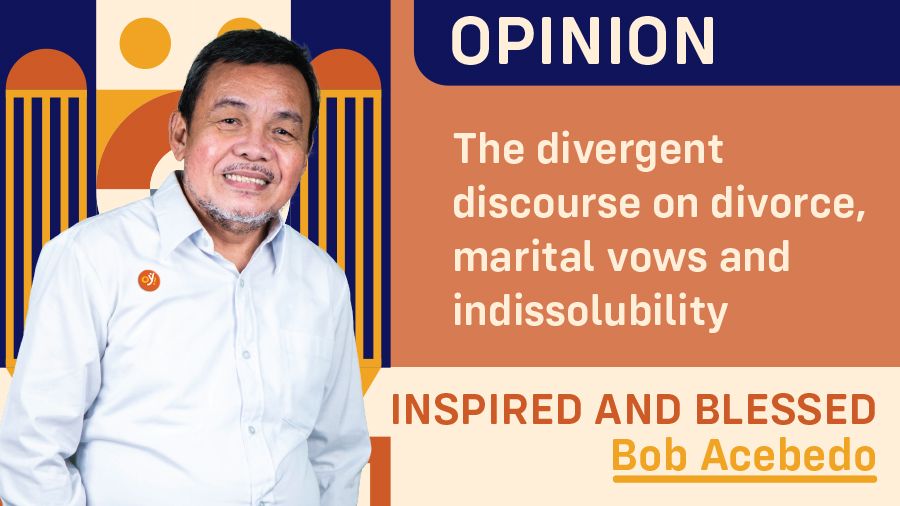“What God has joined together, let no one separate” (Mt. 19:6).
No, pardon the opening line. This piece is not meant to proffer a theological rendition or defense of the sacramentality or sanctity of marriage – albeit, it is an acknowledged given. For the moment, I have to lay aside the biblical and church’s magisterial instructions on the sanctity and indissolubility of marriage – from Gaudium et Spes to Humanae Vitae, to Familiaris Consortio and even to Amoris Laetitia.
Neither will I delve into the abstract anthropological or philosophical arguments as grounded on natural law and that “Lex naturalis est aliquod per rationem (Natural law is something appointed by reason)”. Thus, I’m not ready to jump into the conclusion that “to relegate or leave this wrenching debate on marriage indissolubility and divorce exclusively to pragmatic experience or to married persons only (sans priests because they are unmarried and lack the experiential anchor) would be the tragedy of reason, and truth being sacrificed at the altar of empirical experience.
On the contrary, whence our is indeed a pragmatic and secular society, let me just try to somehow unravel the various differing views or arguments espoused by divergent camps – all of which progenerated from the May 15 approval by the House of Representatives of the proposed Absolute Divorce Act or HB No. 9348, which enumerated the grounds for absolute divorce, to mention, among others – physical violence or abuse, drug addiction, habitual alcoholism, chronic gambling, homosexuality, infidelity or perversion, and abandonment.
Thereafter, an avalanche of reactions and estimations from all camps engulfed the whole continuing discourse. It behooves revisiting them.
For a start, for Albay 1st district Rep. Edcel Lagman, principal author of HB 9348, divorce will afford “remedies to distressed spouses, particularly abused wives, and liberate them and their children from a toxic and destructive conjugal and family environment.”
Pro-divorce advocates, like lawyer Mel Sta. Maria, argue that “allowing divorce will not produce public injury” and, rather, “its objective is to release spouses from a legally created situation no longer serving its purpose due to it being of the considerations forming its basis: mutual love, respect, fidelity, and care.”
Moreover, Sta. Maria contends, absolute divorce is not unconstitutional. “When the constitutional provision stating that ‘marriage as an inviolable social institution’ was being deliberated, the late Fr. Joaquin Bernas SJ, one of our greatest constitutionalists, directly asked Commissioner Chito Gascon, the sponsor of the said provision, if it prohibits or discourages absolute divorce. The categorical answer was ‘No’,” explained Sta. Maria.
However, retired chief justice Hilario Davide says otherwise, asserting that absolute divorce violates select provisions of the 1987 Constitution and emphasized that the first two provisions of Article 15 are clear in describing marriage as “inviolable”. “In Webster’s new international dictionary, ‘inviolable’ means incapable of being broken or destroyed. Indestructible, secured from violation or infringement,” Davide cited.
Law professor Joseph Peter Calleja of San Beda College-Alabang agrees with Davide that marriages are “inviolable”, saying that the word is not ambiguous when multiple dictionaries are consulted. “Whenever possible, words used in the Constitution must be given their ordinary meaning except when technical terms are employed. The term (inviolable) is not ambiguous. It is not technical, it is not capable of two or more contradictory interpretations,” Calleja explained.
Meanwhile, for Davide, what prompted him to oppose the divorce bill are its “relaxed provisions”. He explains: “As one further reads the bill, he[/she] will sooner discover that it also weakens, demeans, degrades, debases or even demonizes marriage as a sacred and inviolable social institution.”
Davide cited that the provisions on summary proceedings, recognizing foreign divorces and yielding to the finality of matrimonial courts makes it easy for married couples to bypass the grounds enumerated in the bill. “I am afraid that some groups may, for profit, form a religious sect for the business of celebrating marriages as well as dissolving marriages,” he said.
Now, in a quite unexpected stance, the Center for Catholic Theology and Social Justice (CCTSI) based at Jesuit-run Ateneo de Manila University threw in the vote for divorce, arguing that the proposed Absolute Divorce Act “is a public issue, not a religious one”.
Among others, CCTSI stated the following salient points in their statement or standpoint:
1) “While not ideal, divorce as contemplated by the authors of the bill, is only for irreparable marriages… it is only a last resort, [and] we must not stand in the way of those who truly need it.
2) “While the church rightly emphasizes its teachings on marriage and the family, it must not lose sight of the reality of the struggles that married couples and families experience in their daily lives.
3) “[Quoting from Pope Francis’ 2016 apostolic exhortation ‘Amoris Laetitia’] the indissolubility of marriage should not be viewed as a ‘yoke’ imposed on humanity but as a ‘gift’ granted to those who are joined in marriage.
4) “There are married couples who ought not to have gotten married in the first place…who are incapable of genuine commitment…who have shown themselves to be abusive of both their spouses and children.
5) “It is not enough that our pastors preach about the sanctity of marriage and resist the impending enactment of the bill into law… We also need to develop comprehensive programs that sufficiently prepare those who receive the sacrament and provide them the necessary support to grow in their married and family life.”
On a similar vein related to the last point cited, Fr. James Gascon SJ, himself a Jesuit also, concurs that people enter into unions with the “wrong” partners. Gascon hopes for an appropriate pastoral approach to problematic marriages.
Fr. Ranhilio Aquino, dean of San Beda University Graduate School of Law, quickly butts in that if violence is the predominant reason to problematic marriages, “there are [already] laws that adequately address these situations.”
Father Aquino adds that with the question on what the government and the Church can do, “[I]t should be first laid down as a premise that however the Church and the State may respond, each must work within broader frameworks in place: in the case of the State, the Constitution; in the case of the Church, its constant teaching as articulated in magisterial documents. Pastorally, the challenge is to the family life apostolate of each ecclesiastical jurisdiction to guide persons planning on marriage to a necessary understanding of its demands and a mature discernment of their capacity to meet these demands.”
Whilst, let me segue to the corollary but indispensable issue related to divorce: marital vows and indissolubility.
In simple terms, the basic argument against divorce is the age-old principle of the indissolubility of marriage and, thus, marital vows are meant to be perpetual (‘til death do us part).
But, it behooves confronting the following queries: In our age of ultra-secular and pragmatic society, are perpetual marital vows still hold an unbridled relevance? With the harrowing statistics of broken marriages, is irrevocable self-giving or spousal commitment still possible? Or, should we just get rid of that hyperbolic lifelong “nonsense” as part of marital vows then, in order to accommodate the logic of divorce?
For one, I’d like to accommodate an answer from my Ph.D. son who’s currently teaching in Netherlands, and he says: “It’s the intrinsic nature of love as portrayed by generations of literature, poetry, and songs to be unconditional. But a contrary suggestion rings true to some cases in the West, wherein some qualify their marriage vows ‘to love, care, and stay until I decide to’. It’s like promising not to lie ‘until I decide to’. Hearing that in relationships feels off, much more in weddings.”
“Promises have facilitated human society to grow. The stability that mutual trust offers allowed human society to expand and develop. Nietzsche would say, ‘Man is the only animal who can make promises’. Promises make us who we are, and it seems divorce may trample that part of us,” my son added.
Whew, kind of being blown off by my son’s answer. For which reason, reckoning on the intrinsic profundity and at the same time pragmatic plausibility of marital love and commitment, I feel obliged adding my son’s answer and put forward the following thoughts:
1) Humans are gifted with the capacity to love, not just for a short period of time but even for always.
2) Irrevocable self-giving is not impossible. It is possible as long as the pursuit of conjugal good is based on total self-giving, otherwise it is just the appearance of the conjugal good – a “mirage”, and not marriage.
3) Love in marriage is neither monolithic (or unchanging) nor perfect. But the desire “ab initio” (from the very start) is for the love to perpetually grow – which the human person is capable of. My bishop friend has this to say: “Marriage in God’s plan is not a haven of love, but a school of love.”
4) A person “is” married, not “stays” married – because couples agree to be married not according to temporal exigency but to each other’s “beingness or personhood”.
But, yes, as already pointed out earlier in this piece – the divorce bill is only for hopeless relationships or irreparable marriages.
But, still, how can we be sure that, if passed into law, its application or implementation will be only for those in hopeless situations, but may even be an opportunity for young couples to be “hopeful” in getting divorce even just for paltry reasons? This resonates to retired chief justice Davide’s reservations regarding the bill’s “relaxed” provisions.
Howbeit, again, lawyer Mel Sta. Maria has a rejoinder: “There is no reason to let exaggerated and hypothetical fears prevent us from affording our citizens relief from their very horrible situations.”
Then, only over a month ago, Catholic and secular citizens alike were stunned by the seemingly unprecedented Catholic Bishops’ Conference of the Philippines’ pastoral statement on divorce.
Opponents of the divorce bill, who expected fireworks from the CBCP, charged that the statement was rather “weak” than “combative”.
In capsule, the CBCP pastoral statement carried the following key points, among others:
1) “Because we believe in the sanctity of marriage, we also believe that not all couples who are married have been ‘joined together by God’. We can apply this on marriage nullity and re-state the same Gospel passage in the reverse: ‘What God has not joined together, human beings can separate.’
2) “…we uphold the principle of separation of Church and State. The Church is in no position to dictate on the Sate what is best for Filipino families… As spiritual and moral leaders of the Church, we can only propose but never impose.
3) “But before we join the bandwagon (of legalizing divorce), shouldn’t we ask ourselves on the basis of research and statistics, (has) the legalization of divorce all over the world indeed helped in protecting the common good and the welfare of the family?
Truly, for my part, somehow caught in the continuing conundrum of the divorce debate, I can only resonate with the CBCP’s soul searching: Has the legalization of divorce all over the world really addressed – or, at least, mitigated – the staggering challenge of problematic marriages? Has the divorce law strengthened or weakened the trust among married couples?
In sum, nevertheless, I’m convinced that the CBCP statement is in no way an indication of weakness. More so, it is but a handwriting on the wall that indeed the Church, embracing the spirit of “synodality”, has truly come of age – it has found its place in our pragmatic and secular society.
#WeTakeAStand #OpinYon #OpinYonColumn #ColumnbyBobAcebedo #InspiredAndBlessed

